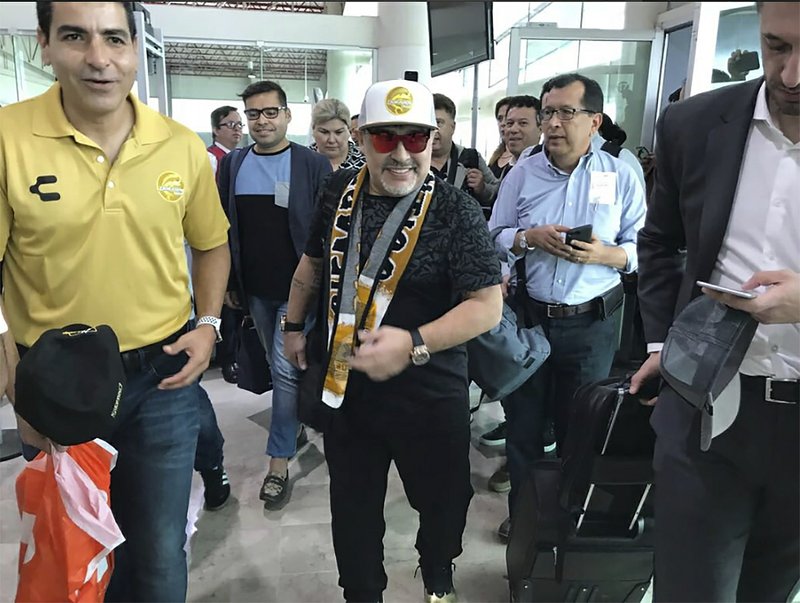Maradona to coach soccer club in Mexico’s cartel heartland

FILE – In this Sept. 8, 2018 file photo provided by Prensa Club Dorados de Sinaloa, Argentine soccer legend Diego Maradona walks through the airport in Culiacan, Mexico. Maradona, the soccer world’s poster child for the perils of substance abuse, is setting up camp to lead a team in the heart of Mexico’s drug cartel land. (Prensa Club Dorados de Sinaloa via AP, File)
CULIACAN, Mexico — Diego Maradona, whose public battles with cocaine made him soccer’s poster child for the perils of substance abuse, is setting up camp in Mexico’s drug cartel heartland as the new coach of a second-tier team.
Draped in official club gear, the Argentine soccer legend arrived this weekend in Culiacan, home turf of the Sinaloa Cartel, to take over the bottom-dwelling Dorados in what some describe as a publicity stunt for the team and a last-ditch effort to resurrect a career marred by drugs and antics.
Maradona, 57, is a big fish for a little-known team founded just 15 years ago. He will reportedly earn $150,000 a month to coach a team where players complain of missed paychecks. A Dorados club representative could not be reached to confirm or deny the salary or missed payments.
Tom Marshall, who covers Mexican soccer for ESPN sports network, said the question floating among fans is whether the Maradona hire is part of a long-term plan to raise the prospects of the Dorados or an “ego trip” for the owners, the Tijuana branch of the politically connected Hank family which also owns casinos and horse racetracks?
Few expect Maradona to succeed in the post. Many anticipate an inevitable clash of personalities.
“Is this kind of a joke?” Marshall wondered. “Is this making Mexican football look a bit ridiculous?”
The gig marks a return to the country where Maradona scored one of the most controversial goals in soccer history during Argentina’s World Cup quarterfinal against England in 1986. Photos and TV replays showed Maradona’s hand helping the ball into the net. He attributed the assist to the “Hand of God.”
The match 32 years ago exemplified Maradona’s theatrics both on and off the field. Some consider him to be the greatest player to have ever played the sport. But he is also prone to outlandish outbursts, profanity-laced tirades and public debauchery.
Maradona struggled openly with drugs for more than a decade after FIFA briefly banned him for testing positive for cocaine in 1991. He again tested positive for drug use during the 1994 World Cup and was subsequently denied entry by the United States, leading him to seek drug rehabilitation treatment in Cuba. He was hospitalized in 2000 and again in ’04 for heart problems blamed on cocaine.
The soccer great began coaching in 1994 with uneven results. He led the Argentine national team to the quarterfinals in the 2010 World Cup before notching stints with the Al Wasl and Al-Fujairah squads in the United Arab Emirates. He accepted a role as honorary president for the Belarus premier team Dinamo Brest in July before promptly departing for Argentina.
But Maradona has gotten more attention recently for his behavior as a spectator at Argentine matches than as a coach. At the 2018 World Cup in Russia, Maradona launched his middle fingers into the air after Argentina bested Nigeria and was captured on video appearing seriously inebriated in the stands. At another match, he apparently pulled his eyes into slants while gazing at a South Korean soccer fan.
Culiacan locals are hopeful that Maradona’s off-field tomfoolery won’t interfere with his ability to lead the Dorados.
“We all make mistakes and we all deserve a second chance,” says Culiacan resident Jose Luis Morales.
The northwestern Mexican state of Sinaloa is an agro-business stronghold known for producing lots of beef, tomatoes and drug lords. By some estimates the drug trade accounts for 20 percent of Sinaloa’s gross domestic product. Drug money permeates throughout Mexico, but narco culture is more visible in places like its capital Culiacan, where residents flash bling and expensive watches.
Sinaloa-raised Joaquin “El Chapo” Guzman climbed to the cartel’s top through a combination of brutal repression of rivals and Robin Hood-like handouts to the poor. The Sinaloa Cartel, run by his sons while El Chapo faces trial in Brooklyn, dominates wholesale distribution of heroin, cocaine and methamphetamine in much of the U.S.
“The Sinaloa Cartel will love Maradona. They are patriots. They really love their home state and this will raise the profile of Sinaloa,” said Mexico security specialist Alejandro Hope, who sees drugs and sports intersecting as much as drugs and music.
But Sinaloa is now contested territory with Guzman in prison. The Sinaloa Cartel has fractured, with top lieutenants challenging the sons for power. And the Jalisco New Generation Cartel is waging war across Mexico, including in Sinaloa. “The whole system is destabilized,” says Vanda Felbab-Brown, an expert on Mexican organized crime with the Brookings Institution.
Adding to the questions surrounding the Dorados, the Hank family’s Tijuana-based gambling operations have long drawn suspicion from U.S. officials. Law enforcement agencies often see gambling as an easy way to launder illegal money, and Tijuana is a major corridor for drug traffic to the United States.
Yesenia Barraza, a 33-year-old soccer mom, hopes Culiacan can overcome the stereotype of being a drug hub. Moms like her are holding Maradona up to their children as a soccer star to emulate.
“As a city we are known for negative things; now we will be known for sports,” she said.